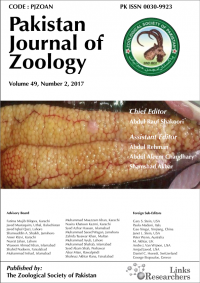The Effect of Fish Meal and Plant-Based Diets on the Growth and Nutritional Composition of White Worms (Enchytraeus albidus Henle, 1837) in Various Substrates
The Effect of Fish Meal and Plant-Based Diets on the Growth and Nutritional Composition of White Worms (Enchytraeus albidus Henle, 1837) in Various Substrates
Ergi Bahrioglu1, Mustafa Hac Isa2, Sibel Cengiz2 and Ertan Ercan2*
ABSTRACT
In this study, the growth and nutritional composition of Enchytraeus albidus (white worm) were investigated using different combinations of culture substrates and feeds. The aim was to determine the utilization of White worm for recycling the fish feeds in case of expiration. The white worms were either given a plant-based diet or a fish feed-based diet (commercial extruded Seabass feed) in four different culture substrates (rice husk, peat, cocopeat, garden soil). There were altogether eight experimental groups with triplicates. The initial stocking density of white worms was 150 worms/unit (2.2 Liters of cylindrical containers), and all the experiments were carried out in the dark at a constant temperature at 18oC. Worms were collected from the substrate by heat treatment and the counting was done manually, using dissection tools. Proximate composition of the produced white worms was measured with regard to given ratios of the protein, carbohydrate and lipid sources provided from the feed materials. The plant-based diet yielded the highest worm density of the study (2220 worms/unit) while the garden soil was used as substrate. In comparison, the fish feed-based diet fed white worms reached a significantly lower density (627 worms/unit) although the optimal nutritional value for the fish diet was ensured. These results showed that the carbohydrate content of the feed for white worm should be adjusted for optimal growth. Furthermore, the use of a combined plant- and fish feed-based diet can result in high growth performance and improved nutritional value during fish feed production.
To share on other social networks, click on any share button. What are these?










